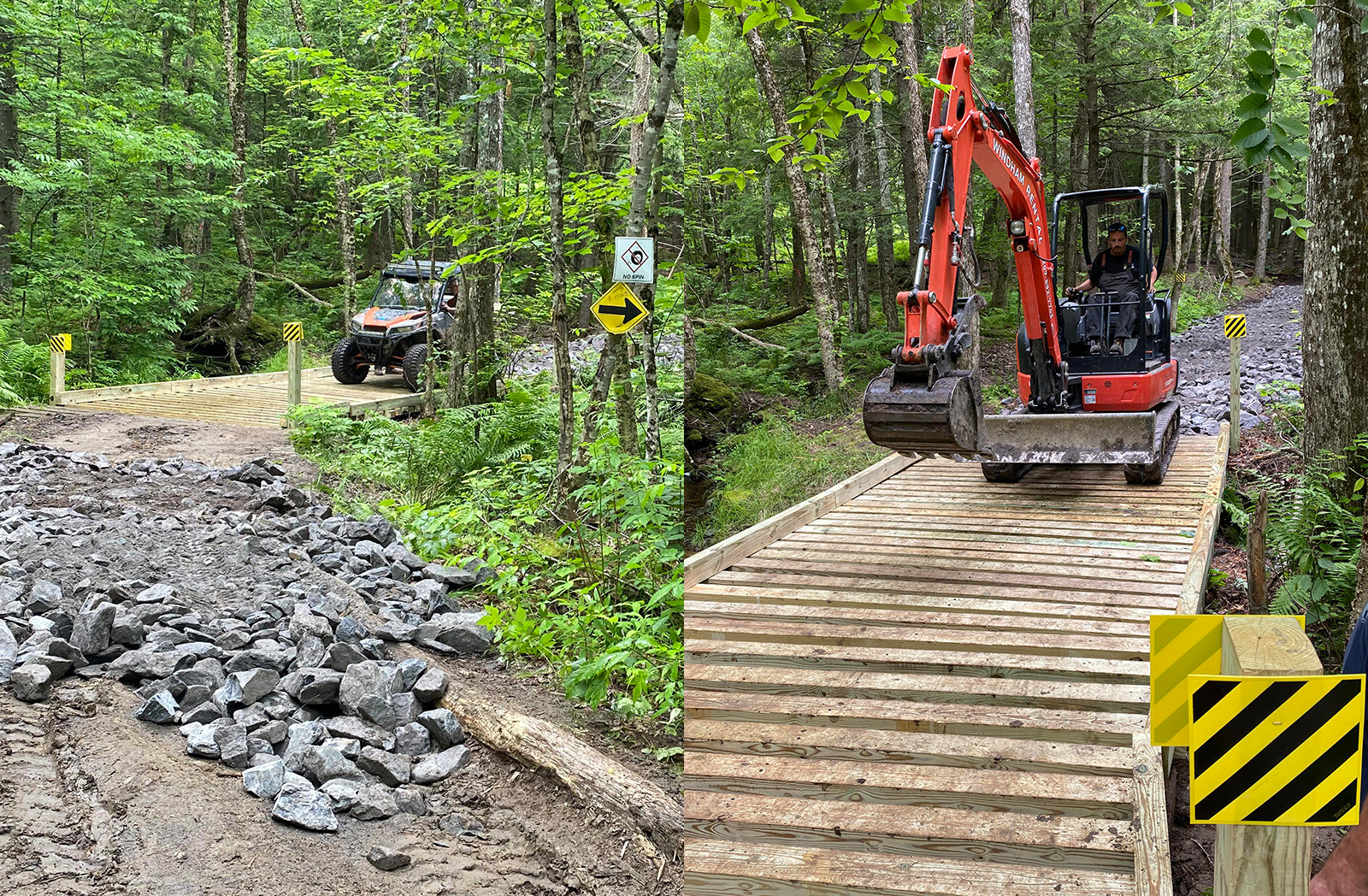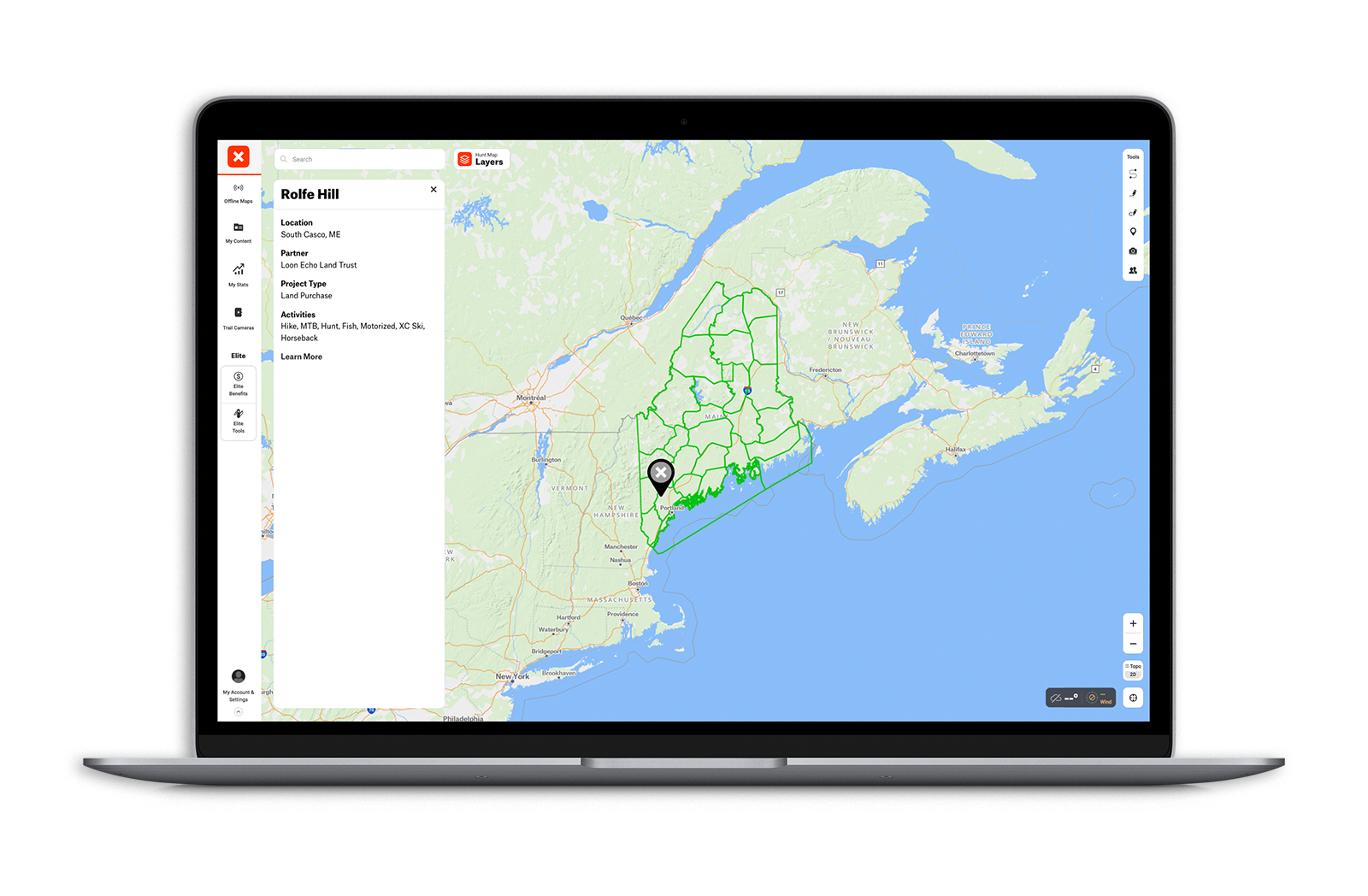Tradition Preserved, Lessons from a Multi-Use 400-Acre Parcel in Maine
Twenty-five miles northwest of Maine’s largest city, Portland, a parcel named Rolfe Hill has been a staple of the local community’s recreation portfolio for over 150 years. It lies within of one of Maine’s fastest-growing counties, Cumberland. With the pressure of increasing commercial development, contiguous recreational and habitat parcels are increasingly sparse in this area. So when this multigenerational, family-owned property went up for sale, it was clear—conservation of its recreational value was paramount. At onX, we see incredible value in that, which is why we contributed to its preservation through our Access and Stewardship Grants Program.
What Is Rolfe Hill?
Loon Echo Land Trust (LELT) joined forces with neighboring organizations, including Sebago Clean Waters, to conserve the property for public access. We caught up with Loon Echo Land Trust’s Executive Director, Matt Markot, to learn more about the history of the parcel, why it’s important, and how the history of Maine’s multi-use ethos works in practice.
As urban sprawl spreads its tentacles westward to the quiet corners of Maine, this 400-acre lot has been sought after for development proposals such as a golf course and luxury housing, according to Markot. This outside interest, combined with its recreational and ecological value, made it compelling for LELT’s radar. The parcel dates back 200 years, all held within the family since the Revolutionary War. “They’ve been really great stewards of the property. It was once part of a much larger land holding that’s eroded over time. This is one of the last pieces that still remain,” states Markot. The family wants to see the property maintained in its current state and continue the legacy of public access.
As with much of New England, it has evidence of farmland. Old stone walls line the ridges, though as Markot puts it, “This area is the rockiest place I’ve ever been, so I can’t imagine how difficult it was to farm there, but they were giving it a shot.” Old foundations from homesteads can be seen as well as an elusive trout or two in the small stream. It connects to a much larger lot owned by a local timber company, connecting it to over 1,000 acres of undeveloped habitat, all within 30 minutes of a city with a population approaching 70,000 people.

Loon Echo Land Trust (LELT) joined forces with neighboring organizations, including Sebago Clean Waters, to conserve the 400-acre parcel of Rolfe Hill for public access.
Photo Credit: Mathew Trogner
Recreational Access
LELT has big plans for the parcel.
“The goal is to advance recreational access—building, repairing, and restoring trails on the property. We’ll be working on habitat restoration through a wetland on the site that’s currently being impounded by a man-made structure,” says Markot.
There’s excitement about the multi-use possibilities in this parcel by both LELT and the broader community.
See, in Maine, it’s traditional that a single parcel can serve many uses—from hunting and fishing to biking and ripping around on ATVs or sleds. Depending on the season, you’re likely to bump shoulders with a hiker wearing blaze orange or a GSP wearing a bell while on point waiting for the flush. Just as common, is having hundreds of miles of snowmobile and ATV trails weaving through private property across the state. No easements, no deeds, no leases required. “The (Rolfe) family have been great stewards and aligned themselves with the Maine ethos of public access to private land.”
That kumbaya image isn’t all organic though. It’s intentional and has been a guiding practice of LELT’s and other land management agencies for years. “We invite a variety of user groups (to the table) and create guidelines that are designed for a wide range of use while also limiting negative interactions and user conflicts.” Looking toward their objective of expanding recreational access, one of the challenges will be managing a growing mountain bike network contrasted with a pronounced hunting heritage. There are examples in other parts of the state where networks are known to close on Saturdays during November or simply placing signage that encourages users to avoid the dawn and dusk hours when hunters are most frequently in the woods. This is built on the belief that these user groups can, and should, coexist. They have been for a long time, and what it takes is a common understanding that this land is meant to be shared between various user groups.
Double-track trails (snowmobile and ATV) are often maintained by motorized clubs throughout the state. They groom and maintain their sections, which provide connectivity to the adjacent network creating a state-wide trail network maintained by grassroots organizations. This system is funded primarily through membership dues (from riders themselves) as well as state funding. This stewardship of the trails takes the burden off the managing land agency.
In the case of Rolfe Hill, there’s an existing snowmobile and ATV trail that connects users to a larger system as well as the business district in downtown Casco. That local system is maintained by the Lakes Region ATV Club. Lonney Girard, the club’s president, states, “Our club is doing substantial erosion control and trail maintenance, annually. We’ve replaced or re-decked 16 bridges in the past 16 years.” The club has operated on an $11,000 spending budget, yet with in-kind donations from their membership have done about $200,000 worth of labor and excavation. It’s groups like these that act as diplomats between land managers and the recreation population keeping access alive.

Lakes Region ATV Club doing trail maintenance in their network.
Photo Credit: Lakes Region ATV Club
Private Land, Public Access
This whole system is founded directly on Maine’s Landowner Liability Law, which is explained by the town of York, “If someone uses your land or passes through your premises for outdoor recreation or harvesting, you assume no responsibility and incur no liability for injuries to that person or that person’s property. You are protected whether or not you give permission to use the land.” This law has instilled good faith within landowners, primarily of large swaths such as timber company holdings, to allow recreational access of all kinds so that the general public can enjoy Maine’s treasured lands.
Well, why is land conservation so important right now in Maine if everything that isn’t posted is good to go? According to Maine Inland Fish and Wildlife, roughly 94% of the forested part of state is privately held. That means that most recreation that happens—whatever your vehicle, discipline, sport, or pastime—is likely going to happen on private land. When the state was mostly farmers and population density was low, that made it simple to know the neighbors across the stone wall. Now, increasing real estate sales, with smaller acreages, are resulting in a state increasingly segmented and, as previously mentioned, posted. This illustrates the importance that land trusts preserve public access, and keep the tradition alive.

According to Maine Inland Fish and Wildlife, roughly 94% of the state is privately held.
The Way Forward
While the neighborly, handshake deals for access were common in these parts for decades, the high turnover rate of property ownership here increases the importance of these types of projects. Creating and maintaining public access in Maine, and across the nation, will continue to grow in importance as urban sprawl develops. With this property, and those like it, onX is excited to help conserve such an integral part of both the habitat and recreational landscape. If you know of a parcel in need of protection or a land trust in need of financial assistance, please consider visiting our grant page to learn more about onX’s funding projects. These projects will help preserve, restore, and open access to parcels for generational enjoyment.